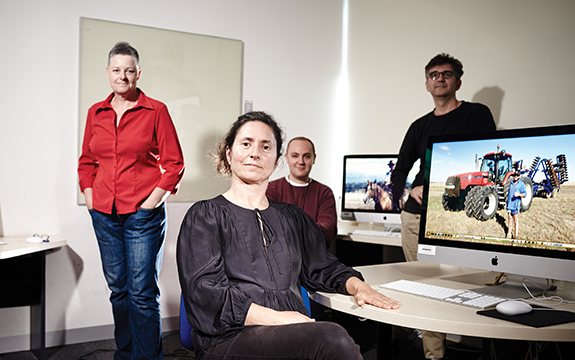Farmers come together at Swinburne to share their experience of rural suicide

In Summary
This article originally featured in Swinburne’s Venture magazine
When the group of farmers arrived at Swinburne University of Technology’s Hawthorn campus late last year, they were quiet and withdrawn.
All 12 had been touched by rural suicide and the university campus was a long way, physically and emotionally, from the world of commodity prices and dam levels.
“By lunchtime, however, they had really opened up and everyone was talking to each other,” Valentina La Piana, Swinburne’s Manager of Screen and Media, says.
“They realised that they weren’t alone, that other people had felt that desolation as well.”
The three-day digital storytelling project aimed to forge connections between farmers, show the pervasiveness of suicide in the bush, and explore the way isolation and depression can be a powder keg in rural communities.
The project was a joint venture between Swinburne and the National Centre for Farmer Health (NCFH). It involved each farmer creating a digital story to be shared with others who have been touched by suicide.
Selected stories have been uploaded to the NCFH website, The Ripple Effect. They can be accessed by other farmers when they log in and share their own story.
Ms La Piana says she was surprised by how many participants used their own voices for their digital projects.
“Digital storytelling involves many techniques to tell a story, such as text or images, but many of them wanted to use their own voice,” she says.
“It was almost as if speaking the words, saying out loud what occurred, was what needed to happen. There was one participant who had not shared his story for 20 years.”
Ms La Piana says the project helped to broaden the way farmers viewed themselves.
“We have this preconception that farmers are stoic and hard, and when times are tough they simply soldier on,” she says.
“But they’re only human. And we needed to redefine what a farmer is, to bring them back into the fold. They face all sorts of pressure with regards to weather, economics and things that don’t even come into our consciousness.”
But, most of all, the project helped foster one of the big panaceas for suicide: connection with others.
“It validated what they were feeling, and I think that peer-to-peer support is really important,” Ms La Piana says.
“There is a stigma attached to suicide and this is overcome by voicing their stories, by making these things known.” At the end of the project, Swinburne staff and the farmers gathered together to view the digital stories in succession.
“The screening was quite a cathartic experience,” Ms La Piana says. “There were people crying, but it was mainly very healing and empowering.”
The impact on the farmers was clear. “You could really see them change, it was visceral,” Ms La Piana says. “It was a physical transformation as well. Their faces changed, they softened.”
Such was the success of the project, Ms La Piana’s team is planning a second digital storytelling workshop in June — this time focusing on suicide in young rural residents.

